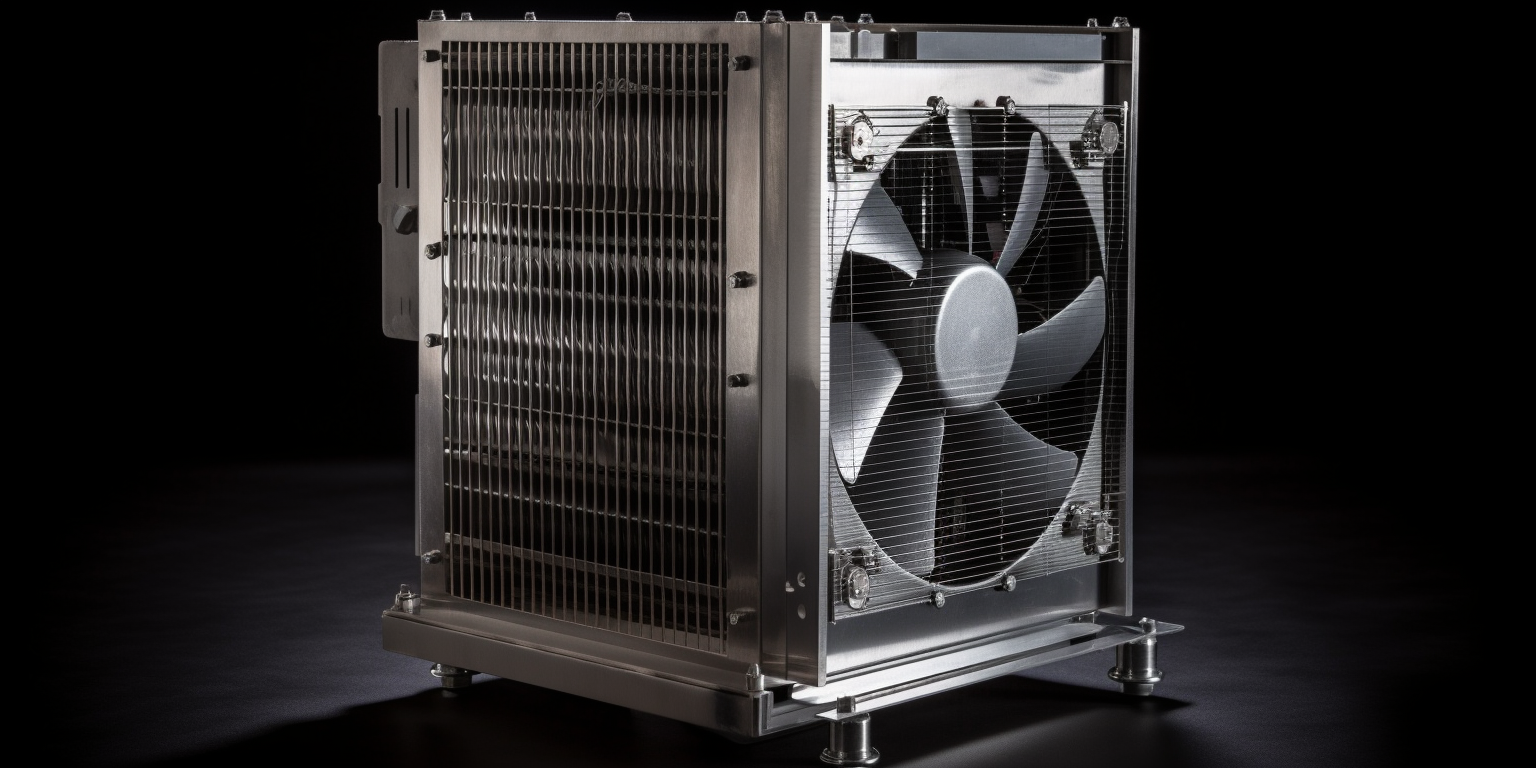
In an industrial refrigeration system, the evaporator plays a pivotal role. Here’s how it works: it’s essentially where the cooling process happens. The refrigerant, at a low temperature and low pressure, enters the evaporator. As it absorbs heat from the substance that needs cooling (like water or air), it changes from a liquid into a gas – a process known as evaporation.
The heat absorption process effectively lowers the temperature of the item we wish to cool—be it fresh groceries in a store, or a room in a sizable structure. After departing the evaporator, the refrigerant gas retraces its path back to the compressor, primed to initiate the next cycle of refrigeration.
Without the evaporator, we wouldn’t have that crucial space where heat gets drawn away from the things we need to keep cool. It’s a simple process but incredibly effective. Just imagine, this one piece of the puzzle helps keep your food fresh, your buildings comfortable, and your industrial processes running smoothly!
How do evaporators work in the process of refrigeration?
Evaporators play a crucial role in the refrigeration process. To get things started, the refrigerant, typically a substance like Freon, enters the evaporator coil as a low-pressure liquid. Then, it’s time for the magic to happen!
The surrounding warm air from the room or product to be cooled is drawn over the evaporator’s coils by a fan. When the air sweeps across the coils, it passes its thermal energy onto the refrigerant housed within these coils. This is where our friend, the law of thermodynamics, steps in. The law dictates that energy, such as heat, moves from a hot object to a cold one.
So, in this case, the heat from the air ‘jumps ship’ to the colder refrigerant. This warms up the refrigerant and, because of its low pressure, helps it to evaporate into a gas. It sounds complicated, but essentially, it’s just a case of swapping around heat energy. The result? Cooler air!
But it doesn’t stop there. This newly created gas is then sucked up by the compressor, and the cycle starts all over again. It’s a loop that keeps going, keeping our refrigerators cold and our food fresh.
So, there you have it, a simple explanation of the role evaporators play in refrigeration. Next time you grab a cold drink from the fridge, remember it’s thanks to the hardworking evaporator coil!
What are the different types of evaporators used in commercial refrigeration?
Evaporators are a key component in a commercial refrigeration system. They come in a plethora of types, each designed to fit a specific need or application.
The Bare Tube Evaporators are often the go-to choice in industries that require high refrigeration capacity. These are simple in design, durable, and able to withstand heavy usage. Evaporators work by channeling the refrigerant through a tube. This refrigerant, by virtue of its unique properties, soaks up heat from the environment, leading to its own evaporation. As it evaporates, it cools down the area, providing the desired temperature control.
Plate Type Evaporators offer a more efficient solution, utilizing a series of plates through which the refrigerant flows. The large surface area of the plates allows for effective heat transfer, making it a popular choice for medium capacity needs.
Fin and Tube Evaporators blend functionality and capability in a unique way. The coolant is effectively transported through the tubes, while the fins play a crucial role in expanding the surface area to aid in heat exchange. You’ll typically spot this type of evaporator in everyday appliances like your home refrigerator and air conditioning units.
Shell and Tube Evaporators are prevalent in large commercial applications. The refrigerant flows through tubes enclosed within a shell. The shell contains the substance to be cooled which flows over the tubes, enabling effective heat transfer.
Lastly, Flooded Evaporators are a variation of the shell and tube type, but involve immersing the tubes in a pool of cooling medium. This ensures maximum surface area contact, enhancing the efficiency of heat transfer.
Each evaporator type has its unique strengths and applications. Choosing the right one is crucial to ensuring the efficient operation of your commercial refrigeration system.
How does the choice of evaporator influence the efficiency of a refrigeration system?
Choosing the right evaporator significantly influences the efficiency of a refrigeration system. The evaporator is responsible for absorbing heat and allowing refrigerant to change from a liquid to a gas.
When you select an evaporator that suits your refrigeration system perfectly, it maximizes the heat exchange process. The refrigerant absorbs more heat, which speeds up its transition to gas. This swift transformation allows the cooling process to happen faster, making your refrigeration system more efficient.
On the other hand, an unsuitable evaporator would mean a slower heat absorption process, leading to the refrigerant taking longer to transform into gas. Consequently, the cooling process becomes slower, and the refrigeration system operates less efficiently.
Moreover, the size of the evaporator plays a crucial role in how effectively it can absorb heat. A larger evaporator has a bigger surface area, increasing the amount of heat it can absorb at once. However, it’s essential to ensure the evaporator isn’t too large for the system, as this could cause the refrigerant to flow too quickly and not absorb enough heat.
Also, the material of the evaporator affects its heat absorption capacity. Some materials, such as copper, are excellent conductors of heat, making them ideal for evaporators.
Therefore, when choosing an evaporator, consider its size, material, and compatibility with your refrigeration system. The right choice can make a significant difference in how efficiently your system operates.
What are some common issues that can arise with evaporators in industrial refrigeration systems, and how can they be prevented or resolved?
In industrial refrigeration systems, evaporators can encounter several common issues. One of these is freezing, where water vapor in the air freezes onto the evaporator coil. This can be prevented by regularly defrosting the system. Another issue is oil logging, where oil accumulates in the evaporator and reduces its efficiency. Installing an oil separator in the refrigeration system can help mitigate this issue.
Leaks are also a common problem, leading to reduced cooling and possible damage to the environment. Regular inspection and maintenance can help in detecting and repairing leaks early. Additionally, issues like inefficient cooling might occur if the evaporator is undersized for the cooling load or if there’s poor air flow across the evaporator coil. Ensuring the evaporator is correctly sized for the application and maintaining clean, unobstructed air paths can help in overcoming this problem.
Corrosion of the evaporator coil is another challenge that can lead to leaks or system failure. This can be prevented by using corrosion-resistant materials for the coil or by applying protective coatings.
Lastly, fouling can occur due to the accumulation of dirt or other materials on the evaporator surface, reducing the system’s heat transfer efficiency. Regular cleaning of the evaporator can keep this issue at bay.
In sum, a combination of proactive design choices and regular maintenance can prevent or resolve many common issues with evaporators in industrial refrigeration systems.
What are some key factors to consider when choosing an evaporator for a commercial refrigeration system?
When you’re on the hunt for the perfect evaporator for your commercial refrigeration system, there are several key factors you should keep in mind. Firstly, consider the load requirements of your system. Evaporators come in various sizes and capacities, and picking the right one can make a significant difference in terms of energy efficiency and performance.
Secondly, take into account the type of refrigerant you plan to use. Different evaporators perform optimally with specific refrigerants, so it’s essential to match these correctly. Don’t forget about the environmental aspect of your choice too – some refrigerants are more eco-friendly than others.
Thirdly, the working environment plays a crucial role in your decision. Will the evaporator operate in a harsh or moderate environment? Some evaporators are better suited to withstand corrosive or extreme conditions, so be sure to choose one that’s up to the task.
Lastly, think about maintainability. Evaporators that are easy to clean and maintain can save you time, money, and hassle in the long run. So, take a good look at the design and accessibility of the evaporator before you make your final choice.
When picking an evaporator for your commercial refrigeration system, don’t rush into a decision. Consider the load requirements, refrigerant compatibility, working conditions, and maintainability to ensure you’re making the best choice for your needs. Remember, a well-chosen evaporator can significantly enhance the performance and efficiency of your refrigeration system.
How can the use of software affect the maintenance and operation of Evaporators?
Evaporators play a critical role in commercial and industrial refrigeration, and maintaining their efficiency is key. With the help of software, we can make this task easier and more effective.
Software tailored for equipment helps monitor their performance in real-time. It provides valuable data, such as temperature and pressure readings, which can be analyzed to spot any irregularities. If the software detects a potential issue, it sends an alert, allowing operators to proactively address the problem before it escalates. This ensures the evaporators continue to operate at peak efficiency, minimizing the risk of unexpected breakdowns.
But it doesn’t stop there. The software also aids in planning routine maintenance tasks. It can predict when certain components might need servicing based on historical data and current performance. This predictive maintenance approach helps avoid costly repair bills and reduces downtime.
In addition, software solutions can help manage power usage, ensuring your equipment run at the most efficient and cost-effective levels. They can adjust the operations based on load, ambient conditions, and other factors. This not only saves energy but also extends the lifespan of the evaporators.
Finally, such software serves as an excellent training tool. It can provide a detailed snapshot of the evaporator’s functioning, helping new staff understand the system faster and better. It also helps experienced staff troubleshoot issues more effectively, promoting a smoother and safer working environment.
Software solutions can dramatically streamline the operation and maintenance of evaporators in commercial and industrial refrigeration. They provide real-time monitoring, predictive maintenance, energy optimization, and valuable training insights, enhancing efficiency, saving money, and ensuring a longer lifespan for your evaporators.
Key Takeaways:
The performance and longevity of evaporators in commercial and industrial refrigeration systems are crucial for efficiency and cost effectiveness. This can be achieved by considering factors such as load requirements, refrigerant compatibility, environmental conditions, and maintainability during the selection process. Alongside this, implementation of software for real-time monitoring, predictive maintenance, and energy optimization can significantly enhance the system’s operation. These measures, combined with proactive design choices and regular maintenance, can effectively tackle common issues, leading to a smooth, efficient, and cost-effective refrigeration process.


